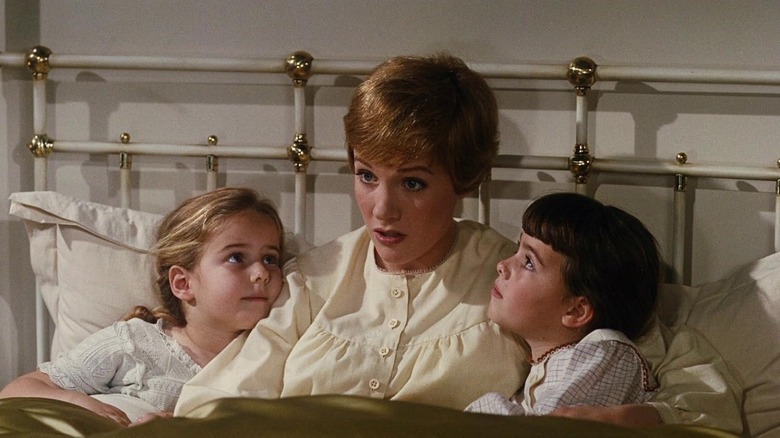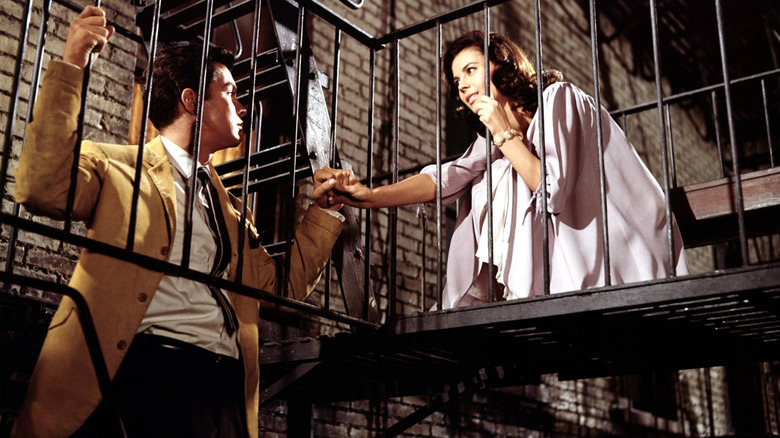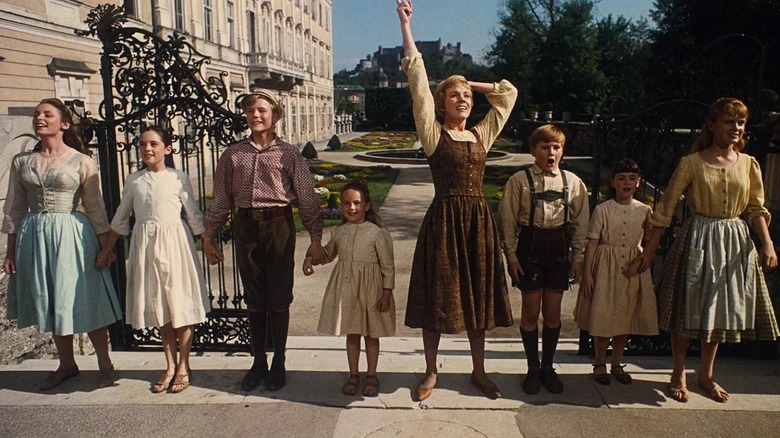The Director Of The Sound Of Music And West Side Story Thought One Classic Was Clearly Above The Other
In a way, you can thank Orson Welles for "West Side Story" and "The Sound of Music." Over 20 years before he directed either of those pictures, Robert Wise got his start as a film music and sound editor at RKO Pictures. He gradually moved on to editing films themselves, which led to his collaborations with Welles on "Citizen Kane" and "The Magnificent Ambersons." You can see a lot of Welles' influence in Wise's later output as a director, particularly his inclination to shoot with long depth of field and precise use of sound. Both of these were essential to Wise's musicals, which snagged Oscars for both Best Director and Best Picture upon their release in 1961 and 1965, respectively.
Beyond that, though, "West Side Story" and "The Sound of Music" couldn't be less alike. "West Side Story" is an impassioned tale of warring New York street gangs and star-crossed lovers fueled by elating musical numbers that leave you sweaty just watching them. It's a film where emotions run hot and there's a sense that violence could erupt at any moment (and it does). The movie's politics are just as fierce and outspoken; as the members of the Puerto Rican Sharks and their girlfriends famously sing in the song "America," "Life is all right in America — If you're all white in America."
Meanwhile, "The Sound of Music" is a sweet, sentimental story about a singing nun and the children she takes care of (starting out as their governess and then becoming an official part of the family) before fleeing the Nazis at the onset of WWII. It's nowhere near as visually dynamic or volatile as "West Side Story," yet Wise takes equal care in bringing its gentler melodies and tender romances to life. Nevertheless, in the filmmaker's eye, there was no comparison: "West Side Story" is better.
Something's coming, and it's not a Rodgers & Hammerstein renaissance
"West Side Story" and "The Sound of Music" were both movies out of time in their own ways. "West Side Story" was a predecessor to not just the darker and more tragic musicals that its lyricist, the legendary Stephen Sondheim, would come to write in the '70s, but also the New Hollywood revolution that began in earnest a few years after its release in 1961. "The Sound of Music," on the other hand, was patently out of step with the '60s' cultural movements by the time it came out in 1965 (which is part of the reason why Fox nearly didn't make it).
Richard Rodgers and Oscar Hammerstein II, who wrote the music and lyrics for the original "Sound of Music" stage show, had shaped the Hollywood musical for decades by then, but they were on the out and would soon be replaced by the Sondheims of the world. Studios, as they're wont to do, immediately flooded the market with "Sound of Music" copycats in the late '60s anyway, desperately hoping to recreate its lightning-in-a-bottle success. The vast majority of these splashy, big-budget musicals got a thumbs-down from critics and landed with a thud at the box office.
Like other genres at the time, musicals were only able to survive by embracing the winds of change. "Fiddler on the Roof" and "Cabaret" helped restore their critical standing in the early '70s. They were emotionally complex, explored socially provocative subject matter, and brought a refreshing grittiness to their song-and-dance spectacles. This was also more or less what Wise liked about "West Side Story" and the reason he held it in higher regard than "The Sound of Music."
Robert Wise felt pretty (good about both movies)
In Jeanine Basinger and Sam Wasson's book "Hollywood: The Oral History," there's a snippet from an old interview with Wise (who passed away in 2005) where he talked about his feelings towards "West Side Story" and "The Sound of Music." While he admitted to preferring "West Side Story," Wise also made it clear that he felt perfectly good about how "The Sound of Music" turned out. He added that he was particularly grateful for the way it benefitted his career and led to him gaining greater recognition. In his own words:
"You always have those films you look back on and feel you turned a corner in your career, that you got more recognition after you did them. As a piece of work, to whatever degree it might be called an artistic thing, 'The Sound of Music' doesn't compare to 'West Side Story' in terms of its textures, feelings, but I think, given the property and what we did with it, I feel very satisfied the way we treated it, and there is a satisfaction certainly, if not from the critics, from knowing the millions of people around the world that loved the film in all countries. This gives you a good feeling."
"West Side Story" is probably stronger than "The Sound of Music" in the way it balances its political elements with the rest of the film, but it feels a little silly to compare them. "The Sound of Music" is also arguably the easier target to pick on because it's saccharine in a way that comes across as more of a feature than a bug. In the end, even the late Christopher Plummer, having spent much of his life taking the piss out of the movie and his role in it, had to admit: "The Sound of Music" is quite beautiful.


